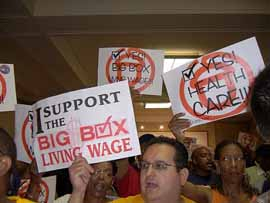Movement for Higher Pay Expanding Nationally: Chicago Living Wage Activists Take on ‘Big Box’ Retailers

Chicago’s city council passed a “Big Box Ordinance” on July 25 requiring large retailers (those with stores over 90,000 square feet) to pay their employees $10 an hour, plus another $3 an hour in benefits, by 2010.
The ordinance is the result of a spirited campaign led by the Association of Community Organizations for Reform (ACORN), unions, faith-based groups, and others who had worked together for more than 10 years to pass earlier living wage laws in Chicago.
The campaign represents only one of a growing number that are aimed at expanding the gains of the living wage movement to more workers. Traditional living wage ordinances have primarily covered employees working on city service contracts, such as janitors and security guards at city buildings.
NATIONAL MOVEMENT
“Too many of us are working 40 hours a week with nothing to show for it,” said home care worker and SEIU 880 Treasurer Flora Johnson. “Minimum wage just isn’t enough.”
Proposals similar to the Chicago ordinance are in the works in dozens of other cities around the country, such as Spokane, Washington, where a signature-gathering drive is underway to place a measure on the fall 2007 ballot.
Some Big Box ordinances, like one passed in Bennington, Vermont, simply ban large retail stores altogether. Others, such as one passed in Turlock, California, add non-wage regulations to large stores.
On a similar front, labor and community activists have pushed for state legislation requiring large employers to provide their workers with health insurance.
Maryland passed a law in 2005 mandating firms with more than 10,000 employees to spend at least eight percent of their payrolls on health benefits or put the money into a state health insurance program for low-income residents. In reality, the law would apply only to Wal-Mart, leading many to see this as an anti-Wal-Mart bill.
The Working Families Party pushed similar legislation in New York, but it failed to pass the Senate.

SUPPORT LABOR NOTES
BECOME A MONTHLY DONOR
Give $10 a month or more and get our "Fight the Boss, Build the Union" T-shirt.
In addition to laws aimed at improving conditions for big box retail employees, living wage activists are increasingly pushing statewide minimum wage measures. These laws are winning much broader coverage, but lower wage levels than the traditional living wage ordinances.
For example, in 2004 Florida voters approved a ballot measure to set the statewide minimum wage at $1 above the federal level, but to index it to inflation. Twenty-two states and Washington, D.C. have passed statewide minimum wages since the last time the federal minimum wage was raised in 1997, and 17 of those have been since the Flordia victory.
STIFFER OPPOSITION
This year, measures are on the ballot in six states, including Arizona, Ohio, Colorado, and Missouri. There have also been recent legislative victories to raise the minimum wage in Massachusetts, North Carolina, and Pennsylvania; the latter two had never had statewide minimum wage laws.
The latest round of living wage activism is meeting more opposition than earlier campaigns. In Maryland, the Retail Industry Leaders Association filed suit against the Wal-Mart health insurance bill and on July 19 a federal judge struck down the law, saying it violated a federal employee benefits law.
In Chicago, Mayor Daley has until September 13 to veto the Big Box ordinance. If he doesn’t, the Retail Industry Leaders Association has threatened to sue. Meanwhile, Wal-Mart lawyers have been busy suing those cities that have passed variations of big box ordinances, even those that don’t include living wage requirements.
Already, Target has announced it is canceling plans to build new stores in Chicago due to the ordinance.
Said Flora Johnson, “Big box stores are getting millions of dollars in tax breaks to build stores in our city, but they don’t want to give back to the community with living wage jobs.”
On the statewide minimum wage front, proponents just beat back an attempt by Republicans to thwart the statewide campaigns. Fearful that the ballot measures due up this fall would increase turnout for Democratic candidates, House Republicans passed a minimum wage measure in July that would increase the federal minimum wage, but also included a permanent reduction of the estate tax.
The bill would have essentially pre-empted the statewide campaigns. In the end, the Senate voted down the measure 56-42, keeping alive the state campaigns that will provide larger increases in the minimum wage.





